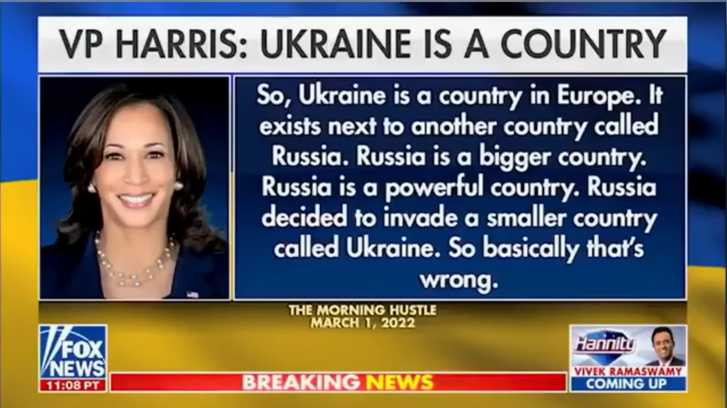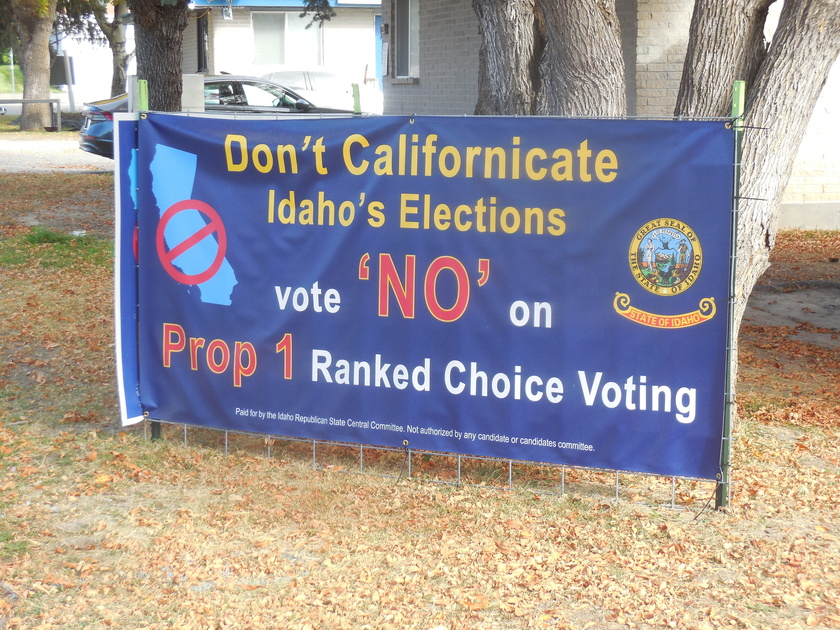
Unless you somehow completely missed all the campaign signs, bumper stickers and flurry of anti-Trump news from the media lately, you know that election day is almost here. Only one more day, as of this writing… unless you did the whole “early voting” thing.
Here in Idaho, the biggest issue on the ballet is known as “Proposition 1”, or “Prop 1” for short. In a nutshell, the claim of this proposed new law is that it will open up primary elections to “unaffiliated voters” (like myself). To other independent voters like myself, it may sound great to some of them on the surface.
That is, until you really start looking into it.
What none of the ads that advocate for it mention, nor any of the five flyers I’ve received in the mail, is a little detail called the “ranked choice voting system” that they want to replace the current system with. Only the radio ads that I’ve heard against it even mention it. I’ll give the pro Prop 1 advocates credit. They’ve done a good job of getting their message out. As I’ve said, I’ve received five of their deceptively “patriotic” themed flyers in the mail. I’ve received none from the opposition.
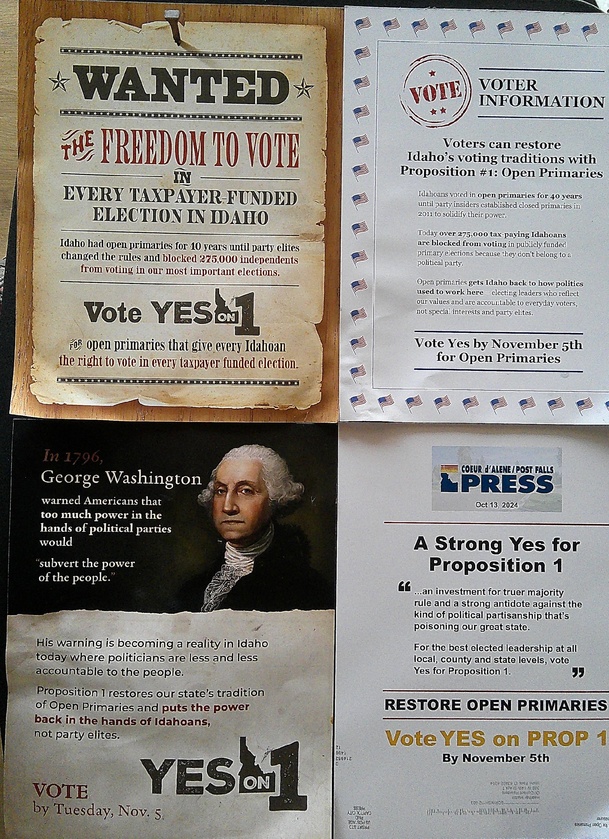
To briefly explain the “ranked choice” system, rather than the standard method of selecting a single candidate for each office, you instead are presented with multiple choices, regardless of political affiliation, and you are asked to rank them from “most desirable” to “least desirable”. You select which candidates according to your desirability, and the candidates with the highest rank in each office wins.
I’ve been vaguely familiar with the system since grade school, when one of my teachers praised it, touting that “this is how they do it in Australia, and it makes so much more sense!” Several states in America also use this system in certain situations, especially California. But others like myself believe that this method makes elections unnecessarily convoluted. That, and open primaries in general, as beneficial as it would be to more (dare I say) honest voters like myself, open the electoral process to cheating… as if we didn’t have enough problems with the system already.
Besides, it’s already possible for an independent voter to vote for a primary candidate in a different party. Under Idaho law, you can change your party affiliation right up to the day of the election. Then you can switch back after the election is over.
Under an open primary, what is to stop one party… let’s say, the Democrats… from organizing a movement to vote for the weakest Republican candidate on the primary election ticket? Then during the general election, they just vote for their Democrat candidate, who is now facing a weak Republican challenger with Republican voters asking themselves “how the hell did he win the primaries?”
Sure, the Republicans could pull that stunt too, but let’s face it. Which party is notorious for registering dead people to vote?
Thankfully, I did receive a ballot pamphlet in the mail that went into great detail of what exactly Prop 1 was about. It listed the pros and cons, as well as arguments for and against it. It also came with eight pages, divided into 42 sections, of legalese of how Prop 1 would be implemented. That right there sealed my decision to vote against it. Before then, I wasn’t sure if I would vote against it, or just abstain.
Eight pages. 42 sections.
I’m reasonably intelligent, and I found it hard to follow. Many people wouldn’t be able to make heads or tales out of it. Try reading a couple of the paragraphs and you’ll see.
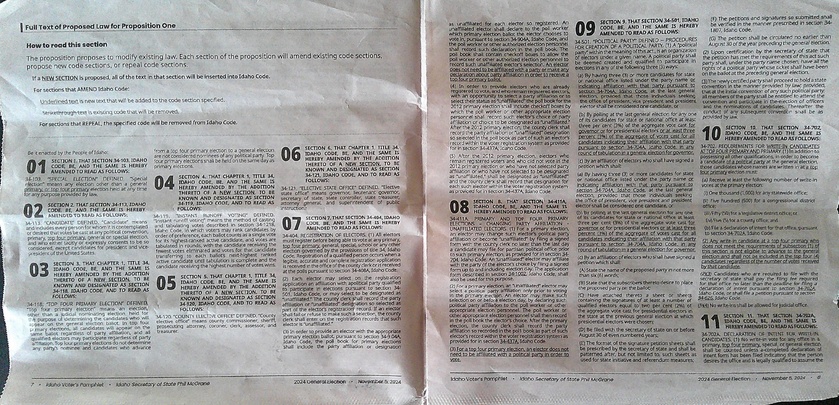
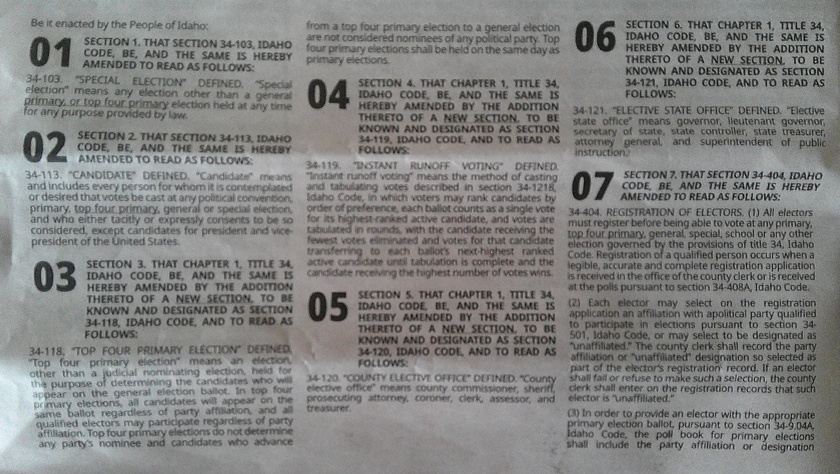
So now we get to the main point of why people outside Idaho should care about this. It’s not Prop 1 per se that’s my issue. My real issue is the deceitful manner in which many of these new laws and regulations are presented. So many new laws and regulations are hidden under a guise of pretty words, benevolent intentions and patriotic messages on the outside. On the inside the real intentions are buried under an avalanche of confusing text. Just look at the flyers and the voter pamphlet.
I hate deceitful marketing, whether it comes from the economy or the government. Only the government is worse because it has a far greater consequences, without you realizing it... at first. At least in the free market economy, you can get restitution either from at best, a refund or at worst, a lawsuit. A company’s failure to provide deserved restitution can result in financial loss and worse, reputation.
There is no restitution from the government for deceit and wrongdoing, or at least it’s so close to impossible, that it may as well be. And the government has already proven that it doesn’t care about its reputation.


